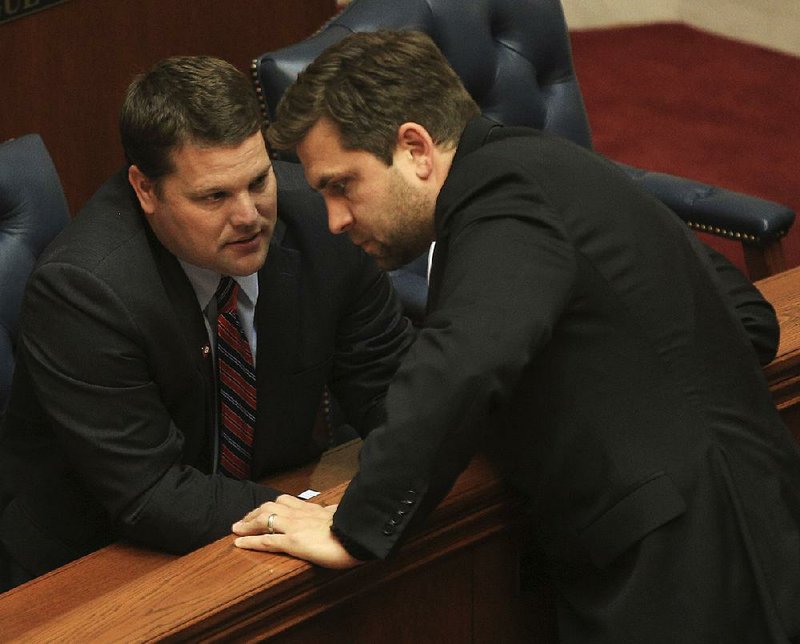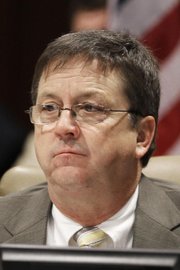Arkansas' legislative leaders say they want to shift their focus in the fiscal session to the nitty-gritty of approving appropriation bills for more state agencies and to Gov. Asa Hutchinson's proposed $5.33 billion general revenue budget, now that lawmakers have passed the Medicaid funding bill.
On Thursday, the Republican governor vetoed a section of the Medicaid funding legislation. His aim was to continue funding for Arkansas' Medicaid expansion to provide insurance coverage for low-income people beyond Dec. 31.
Lawmakers hope to wrap up the state's fourth-ever fiscal session, which started April 13, within the next two weeks. The House and Senate are to resume action Tuesday -- the 14th day of the fiscal session.
"I think that we'll start to push a wind-down," said Sen. Larry Teague, D-Nashville, co-chairman of the Legislature's Joint Budget Committee.
"We're going to start trying where we can get in a position to work on the Revenue Stabilization [Act], and we can go home," he said. The Revenue Stabilization Act outlines how the state will distribute general revenue to agencies in fiscal 2017, which starts July 1.
The Joint Budget Committee co-chairman, Rep. Lane Jean, R-Magnolia, said he hopes the Republican-dominated Legislature passes the general revenue budget by May 6.
Hutchinson's proposed $5.33 billion general revenue budget for fiscal 2017 represents a $142.7 million increase over fiscal 2016's budget and factors in nearly $101 million in individual income tax rate cuts that were enacted by the 2015 Legislature. Most of the governor's proposed funding increase would go to the Department of Human Services and to public schools.
The governor had repeatedly warned that failing to reauthorize the use of federal Medicaid dollars to purchase private health insurance for low-income Arkansans would create a more than $100 million "hole" in the budget and would end his plan to call a special session this spring to consider increasing state highway funding to match and receive additional federal highway dollars.
"At this point, I don't think there are a lot of issues with the governor's proposed budget," Senate President Pro Tempore Jonathan Dismang, R-Searcy, said Thursday.
"I am assuming [the final budget] will be very similar to that. Maybe some minor tweaks," he said.
Jean said he hasn't heard much opposition to the governor's proposed budget, so he expects the Legislature to pass it.
Teague said he's asked state officials to consider adding a cost-of-living raise for state employees in the fiscal 2017 budget. A 1 percent cost-of-living raise would cost the state $7 million to $8 million in general revenue, he said.
Jean said neither House Speaker Jeremy Gillam, R-Judsonia, nor Hutchinson has mentioned anything to him about a cost-of-living raise for state employees, "so I'll let Mr. Teague work from his end first."
Hutchinson proposes increasing DHS funding by $111.9 million for a total of $1.44 billion.
The proposal would increase the budget for the department's grants, including Medicaid, by $88 million for a total of $1.06 billion; increase the budget for the Children and Family Services Division by $20.4 million, giving it $91.5 million; and increase the Division of Behavioral Health's budget by $3.5 million, so its budget would be $82.3 million.
Sen. Bart Hester, R-Cave Springs, who is a foster parent, said some proposed funding in the budget is for programs that are less important than the foster care system and the Division of Children and Family Services, and the latter "aren't getting the funding that they need."
"There will be things that I will attempt to try to roll back [in the budget], and we'll see," he said. "I don't know how you roll back [$850,000 in state funding] for War Memorial Stadium in half. You either cut it, or you don't," he said.
"I will absolutely be looking forward to some options to AETN funding," Hester said, referring to the Arkansas Educational Television Network, funding for which he has said he would attempt to reduce.
The network has a budget of about $15 million a year, including $5.3 million in state general revenue to pay for its operations and a $3.5 million-a-year grant from the state Department of Education to provide online professional development for educators, AETN Executive Director Allen Weatherly told lawmakers last month. The network also receives funds from the Corporation for Public Broadcasting and from pledge drives and other sources, and has 110 employees, he said.
Hester, who has said he would try to cut the state's higher-education budgets, said "if there is not room in the budget [for needs he considers more important], absolutely," he will push to reduce higher-education funding.
Under Hutchinson's plan, the general revenue budget would remain flat for colleges and universities at $733 million.
Hester said Arkansas Tech University in Russellville "turns out a high percentage of graduates and is a quality institution at a less dollar [to the state] than other places, and I think that if they can do it, others can too."
But Jean said he has heard little legislative discussion about cutting the budget for the state's higher-education institutions.
Also, Sen. David Burnett, D-Osceola, said he hopes to restore the $1 million that was cut in state support for libraries across the state.
Rainy-day, highway funds
The state has $51.6 million in surplus funds and $31.1 million left in its rainy-day fund, said Jake Bleed, a spokesman for the Department of Finance and Administration. The rainy-day fund is used for emergencies and the governor's priorities that can't wait for the next legislative session for funding.
Also, the state is projecting a $35.9 million surplus at the end of fiscal 2016. Some lawmakers have said they expect the 2016 surplus to exceed $100 million.
Dismang, who has said he would like the state to have more money in a rainy-day fund, said "part of that discussion is going to go along with the highway plan and utilizing some of those [General Improvement Funds] for that.
"But then also, I think we are at a point where we can start having a discussion about what happens to those additional funds and how those should be set aside," he said.
In January, Hutchinson proposed increasing state highway funding by $46.9 million in fiscal 2017 as a match for more federal highway dollars. He would tap $20 million of the state's unobligated surplus; use $20 million of the state's rainy-day fund; use $5.4 million that now goes to state central services, which includes money for constitutional offices; and reallocate $1.5 million from the state's sales tax collections on new and used vehicles. He wants to use existing state revenue rather than raise taxes.
Hutchinson has projected that his plan to tap surplus funds and other state revenue would raise $64.1 million in fiscal 2018, $71.1 million in fiscal 2019, $76.1 million in fiscal 2020 and $81.1 million in fiscal 2021 to put toward more federal matches for the state's highways. He estimated that $48 million a year of the increased highway funds in fiscal 2018-21 would come from devoting 25 percent of the state's General Improvement Fund.
Hutchinson said Thursday that after the fiscal session, he plans to call a special session to include his proposal for highway funding.
"We've already started re-engaging in the work on that, meeting with legislators. They've been working on it. [There are] different ideas out there, in addition to the plan I have been presented," he said.
The U.S. fiscal year starts Oct. 1, which is when additional federal highway funds will become available.
The highway funding "is still an urgent need for our state because of the matching funds that are needed in September, so that will be on the agenda of the special session," Hutchinson said.
Gillam said there are "probably two, three or four other ideas out there" among lawmakers in the House and Senate on how to increase state highway funding.
"I don't know that they are all competing as much as there are ... ideas that may fit into a larger landscape of the issue," he said.
Gillam said some lawmakers have raised the idea of tax increases, "but they also have decreases in their ideas, too, so it may still follow the principle of revenue neutrality."
Now that the Medicaid bill has been approved, "we will start to hear about highway plans," he said.
Other than highway funding, Hutchinson said he hasn't determined what other items he may include in the call for the special session.
"I think we are going to be looking at probably what we characterize as miscellaneous ideas for a special session," Gillam said.
"I know that Sen. [Jason] Rapert has worked on some levee legislation," he said. "I think there are some school security issues that Sen. [Bill] Sample has looked at." Rapert is a Republican from Bigelow, and Sample is a Republican from Hot Springs.
As for separating the state holiday for the birthdays of Martin Luther King Jr. and Robert E. Lee, "we'll see just how motivated" Hutchinson is about putting that issue on the call for the special session, Gillam said.
"I am sure that we'll get a chance to visit about that over the next couple of weeks before he really starts to [decide] what will be on the call," he said.
Medicaid funding
On Thursday, Hutchinson used his line-item veto authority to excise the Dec. 31 sunset provision from the Arkansas Works legislation and signed Senate Bill 121 to grant $8.4 billion in spending authority to the DHS Medical Services Division, including $1.7 billion for the Medicaid expansion.
Overturning Hutchinson's veto would require a majority vote in the 35-member Senate and the 100-member House of Representatives.
The Medicaid expansion now covers about 267,000 Arkansans, most of whom are under the private option, which takes federal money to buy private insurance coverage. The program extended medical coverage to those with incomes at 138 percent of the poverty level: $16,394 for an individual or $33,534 for a family of four.
For Arkansas Works, Hutchinson made changes in the coverage plan to encourage enrollees to work and take more personal responsibility.
So far, the state's Medicaid expansion has been wholly paid for by the federal government. But on Jan. 1, the state will start paying 5 percent of the cost -- estimated at $43 million for 2017. By 2020, the state's cost will rise to 10 percent.
Opponents of Arkansas Works said they expect a Senate motion Tuesday to try to overturn Hutchinson's veto of the Dec. 31 sunset provision.
"We don't have complete closure at this point," said Dismang, who is one of three legislative architects on Arkansas' initial version of the Medicaid expansion called the private option.
SundayMonday on 04/24/2016



